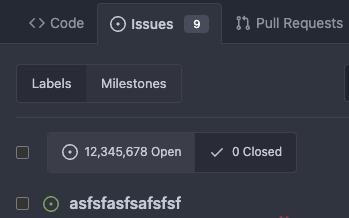mirror of
https://codeberg.org/forgejo/forgejo.git
synced 2024-12-30 11:23:56 -05:00
Follow #21429 & #22861 Use `<gitea-locale-number>` instead of backend `PrettyNumber`. All old `PrettyNumber` related functions are removed. A lot of code could be simplified. And some functions haven't been used for long time (dead code), so they are also removed by the way (eg: `SplitStringAtRuneN`, `Dedent`) This PR only tries to improve the `PrettyNumber` rendering problem, it doesn't touch the "plural" problem. Screenshot:  
226 lines
5.6 KiB
Go
226 lines
5.6 KiB
Go
// Copyright 2018 The Gitea Authors. All rights reserved.
|
|
// SPDX-License-Identifier: MIT
|
|
|
|
package util
|
|
|
|
import (
|
|
"regexp"
|
|
"strings"
|
|
"testing"
|
|
|
|
"github.com/stretchr/testify/assert"
|
|
)
|
|
|
|
func TestURLJoin(t *testing.T) {
|
|
type test struct {
|
|
Expected string
|
|
Base string
|
|
Elements []string
|
|
}
|
|
newTest := func(expected, base string, elements ...string) test {
|
|
return test{Expected: expected, Base: base, Elements: elements}
|
|
}
|
|
for _, test := range []test{
|
|
newTest("https://try.gitea.io/a/b/c",
|
|
"https://try.gitea.io", "a/b", "c"),
|
|
newTest("https://try.gitea.io/a/b/c",
|
|
"https://try.gitea.io/", "/a/b/", "/c/"),
|
|
newTest("https://try.gitea.io/a/c",
|
|
"https://try.gitea.io/", "/a/./b/", "../c/"),
|
|
newTest("a/b/c",
|
|
"a", "b/c/"),
|
|
newTest("a/b/d",
|
|
"a/", "b/c/", "/../d/"),
|
|
newTest("https://try.gitea.io/a/b/c#d",
|
|
"https://try.gitea.io", "a/b", "c#d"),
|
|
newTest("/a/b/d",
|
|
"/a/", "b/c/", "/../d/"),
|
|
newTest("/a/b/c",
|
|
"/a", "b/c/"),
|
|
newTest("/a/b/c#hash",
|
|
"/a", "b/c#hash"),
|
|
} {
|
|
assert.Equal(t, test.Expected, URLJoin(test.Base, test.Elements...))
|
|
}
|
|
}
|
|
|
|
func TestIsEmptyString(t *testing.T) {
|
|
cases := []struct {
|
|
s string
|
|
expected bool
|
|
}{
|
|
{"", true},
|
|
{" ", true},
|
|
{" ", true},
|
|
{" a", false},
|
|
}
|
|
|
|
for _, v := range cases {
|
|
assert.Equal(t, v.expected, IsEmptyString(v.s))
|
|
}
|
|
}
|
|
|
|
func Test_NormalizeEOL(t *testing.T) {
|
|
data1 := []string{
|
|
"",
|
|
"This text starts with empty lines",
|
|
"another",
|
|
"",
|
|
"",
|
|
"",
|
|
"Some other empty lines in the middle",
|
|
"more.",
|
|
"And more.",
|
|
"Ends with empty lines too.",
|
|
"",
|
|
"",
|
|
"",
|
|
}
|
|
|
|
data2 := []string{
|
|
"This text does not start with empty lines",
|
|
"another",
|
|
"",
|
|
"",
|
|
"",
|
|
"Some other empty lines in the middle",
|
|
"more.",
|
|
"And more.",
|
|
"Ends without EOLtoo.",
|
|
}
|
|
|
|
buildEOLData := func(data []string, eol string) []byte {
|
|
return []byte(strings.Join(data, eol))
|
|
}
|
|
|
|
dos := buildEOLData(data1, "\r\n")
|
|
unix := buildEOLData(data1, "\n")
|
|
mac := buildEOLData(data1, "\r")
|
|
|
|
assert.Equal(t, unix, NormalizeEOL(dos))
|
|
assert.Equal(t, unix, NormalizeEOL(mac))
|
|
assert.Equal(t, unix, NormalizeEOL(unix))
|
|
|
|
dos = buildEOLData(data2, "\r\n")
|
|
unix = buildEOLData(data2, "\n")
|
|
mac = buildEOLData(data2, "\r")
|
|
|
|
assert.Equal(t, unix, NormalizeEOL(dos))
|
|
assert.Equal(t, unix, NormalizeEOL(mac))
|
|
assert.Equal(t, unix, NormalizeEOL(unix))
|
|
|
|
assert.Equal(t, []byte("one liner"), NormalizeEOL([]byte("one liner")))
|
|
assert.Equal(t, []byte("\n"), NormalizeEOL([]byte("\n")))
|
|
assert.Equal(t, []byte("\ntwo liner"), NormalizeEOL([]byte("\ntwo liner")))
|
|
assert.Equal(t, []byte("two liner\n"), NormalizeEOL([]byte("two liner\n")))
|
|
assert.Equal(t, []byte{}, NormalizeEOL([]byte{}))
|
|
|
|
assert.Equal(t, []byte("mix\nand\nmatch\n."), NormalizeEOL([]byte("mix\r\nand\rmatch\n.")))
|
|
}
|
|
|
|
func Test_RandomInt(t *testing.T) {
|
|
int, err := CryptoRandomInt(255)
|
|
assert.True(t, int >= 0)
|
|
assert.True(t, int <= 255)
|
|
assert.NoError(t, err)
|
|
}
|
|
|
|
func Test_RandomString(t *testing.T) {
|
|
str1, err := CryptoRandomString(32)
|
|
assert.NoError(t, err)
|
|
matches, err := regexp.MatchString(`^[a-zA-Z0-9]{32}$`, str1)
|
|
assert.NoError(t, err)
|
|
assert.True(t, matches)
|
|
|
|
str2, err := CryptoRandomString(32)
|
|
assert.NoError(t, err)
|
|
matches, err = regexp.MatchString(`^[a-zA-Z0-9]{32}$`, str1)
|
|
assert.NoError(t, err)
|
|
assert.True(t, matches)
|
|
|
|
assert.NotEqual(t, str1, str2)
|
|
|
|
str3, err := CryptoRandomString(256)
|
|
assert.NoError(t, err)
|
|
matches, err = regexp.MatchString(`^[a-zA-Z0-9]{256}$`, str3)
|
|
assert.NoError(t, err)
|
|
assert.True(t, matches)
|
|
|
|
str4, err := CryptoRandomString(256)
|
|
assert.NoError(t, err)
|
|
matches, err = regexp.MatchString(`^[a-zA-Z0-9]{256}$`, str4)
|
|
assert.NoError(t, err)
|
|
assert.True(t, matches)
|
|
|
|
assert.NotEqual(t, str3, str4)
|
|
}
|
|
|
|
func Test_RandomBytes(t *testing.T) {
|
|
bytes1, err := CryptoRandomBytes(32)
|
|
assert.NoError(t, err)
|
|
|
|
bytes2, err := CryptoRandomBytes(32)
|
|
assert.NoError(t, err)
|
|
|
|
assert.NotEqual(t, bytes1, bytes2)
|
|
|
|
bytes3, err := CryptoRandomBytes(256)
|
|
assert.NoError(t, err)
|
|
|
|
bytes4, err := CryptoRandomBytes(256)
|
|
assert.NoError(t, err)
|
|
|
|
assert.NotEqual(t, bytes3, bytes4)
|
|
}
|
|
|
|
func Test_OptionalBool(t *testing.T) {
|
|
assert.Equal(t, OptionalBoolNone, OptionalBoolParse(""))
|
|
assert.Equal(t, OptionalBoolNone, OptionalBoolParse("x"))
|
|
|
|
assert.Equal(t, OptionalBoolFalse, OptionalBoolParse("0"))
|
|
assert.Equal(t, OptionalBoolFalse, OptionalBoolParse("f"))
|
|
assert.Equal(t, OptionalBoolFalse, OptionalBoolParse("False"))
|
|
|
|
assert.Equal(t, OptionalBoolTrue, OptionalBoolParse("1"))
|
|
assert.Equal(t, OptionalBoolTrue, OptionalBoolParse("t"))
|
|
assert.Equal(t, OptionalBoolTrue, OptionalBoolParse("True"))
|
|
}
|
|
|
|
// Test case for any function which accepts and returns a single string.
|
|
type StringTest struct {
|
|
in, out string
|
|
}
|
|
|
|
var upperTests = []StringTest{
|
|
{"", ""},
|
|
{"ONLYUPPER", "ONLYUPPER"},
|
|
{"abc", "ABC"},
|
|
{"AbC123", "ABC123"},
|
|
{"azAZ09_", "AZAZ09_"},
|
|
{"longStrinGwitHmixofsmaLLandcAps", "LONGSTRINGWITHMIXOFSMALLANDCAPS"},
|
|
{"long\u0250string\u0250with\u0250nonascii\u2C6Fchars", "LONG\u0250STRING\u0250WITH\u0250NONASCII\u2C6FCHARS"},
|
|
{"\u0250\u0250\u0250\u0250\u0250", "\u0250\u0250\u0250\u0250\u0250"},
|
|
{"a\u0080\U0010FFFF", "A\u0080\U0010FFFF"},
|
|
{"lél", "LéL"},
|
|
}
|
|
|
|
func TestToUpperASCII(t *testing.T) {
|
|
for _, tc := range upperTests {
|
|
assert.Equal(t, ToUpperASCII(tc.in), tc.out)
|
|
}
|
|
}
|
|
|
|
func BenchmarkToUpper(b *testing.B) {
|
|
for _, tc := range upperTests {
|
|
b.Run(tc.in, func(b *testing.B) {
|
|
for i := 0; i < b.N; i++ {
|
|
ToUpperASCII(tc.in)
|
|
}
|
|
})
|
|
}
|
|
}
|
|
|
|
func TestToTitleCase(t *testing.T) {
|
|
assert.Equal(t, ToTitleCase(`foo bar baz`), `Foo Bar Baz`)
|
|
assert.Equal(t, ToTitleCase(`FOO BAR BAZ`), `Foo Bar Baz`)
|
|
}
|

